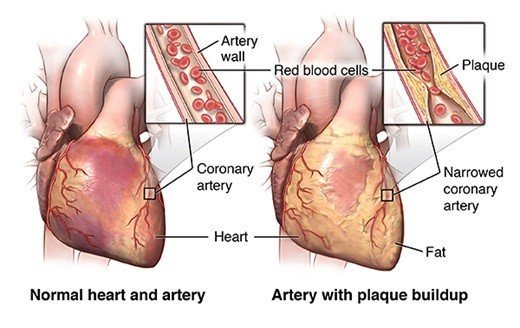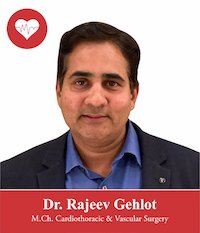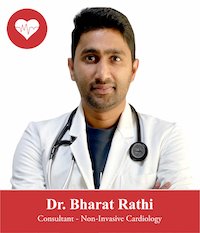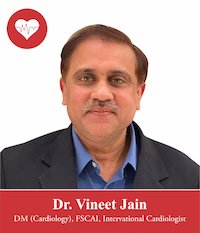CABG / Bypass Surgery
Overview -
CABG or Coronary artery bypass grafting or heart bypass surgery is a surgical procedure used to treat coronary artery disease or coronary heart disease. Coronary artery - The blood vessels that carry blood to your heart become blocked in coronary artery disease. CABG heart surgery bypasses blocked or restricted coronary (heart) arteries or blood vessels by using blood channels from another section of your body. The CABG Bypass surgery helps people whose blood vessels have narrowed or been blocked by fatty material. Bypass allows blood & oxygen to flow to the heart muscle. CABG bypass surgery is an effective way of treating the severe narrowing of the coronary arteries. CABG procedure can improve heart function and reduce the risk of dying of heart disease.
Why it's done -
CABG bypass surgery is one treatment option if you have a blocked artery or blood vessels to your heart. Artery blockages can cut off blood flow and cause heart attacks or heart attack-like symptoms. The doctor uses CABG heart surgery or coronary artery bypass graft surgery to treat a blocked artery or narrow one or more coronary arteries to improve blood flow & oxygen supply to the heart muscle.
Symptoms of coronary artery disease may include:
Fatigue (severe tiredness)
Chest pain
Abnormal heart rhythms
Palpitations
Shortness of breath
Swelling in the hands and feet
Indigestion
CAD -
Coronary Artery Disease is a severe health issue. The blood vessels that carry blood to your heart become blocked in this disease. Coronary artery disease is the clogged and narrowing of the coronary arteries. Coronary arteries are the blood vessels that supply oxygen and nutrients to the heart. Coronary Artery Disease (CAD) is caused by a build-up of fatty material within the walls of the blood vessels. Coronary artery (CAD) disease can cause angina, which is chest pain when the supply of oxygen-rich blood to the heart becomes restricted.
Surgery Procedure –
Coronary bypass surgery or CABG Bypass surgery generally takes three and six hours and requires general anaesthesia. In this surgical procedure, the number of bypasses you need depends on where in your heart and how severe your blockages are. During this bypass surgery, blockages are not removed, and instead, a new pathway is created around the blocked part of a coronary artery.
On the day of bypass surgery, the patient will be guided to a Cardiothoracic Operation theatre at Medipulse Hospitals. Firstly, a healthy blood vessel is taken from another body part. This is the bypass graft. The graft is attached to the blood vessels or coronary artery beyond the blockage. This way, blood flows through the graft & bypasses the blocked part of the artery.
Risk and complications -
There are a few risks and complications involved in bypass surgery, some are:
Breathing problems
Fast or irregular heartbeat
Nerve injury or muscle spasms
Infection of the incision sites
Pneumonia (lung infection)
Excessive bleeding
Memory problems or confusion
Heart attack, stroke, or death
Do’s and Don’ts after Bypass Surgery :
Do’s:
You have to wear loose clothes that don’t stick to your body as the surgical incision of the bypass surgery needs air.
You have to clean your bypass surgery incision with medically approved lotions & solutions but avoid stiff detergents and antiseptics as it may cause discomfort & lead to infection.
You have to Sleep straight and avoid sleeping on your stomach, at least for the first month, as you don’t want your fat or muscles to add pressure to the bypass surgery wound.
Take bath with lukewarm water instead of hot water. Avoid shower, as the intense pressure of the shower water can cause incision rupture.
If you notice blood spots, rashes, or swelling near the incision, consult your doctor immediately.
Patients who have had bypass surgery should do cardiovascular exercise such as slow pace walking or jogging, and they should avoid stress.
Don’ts :
Increase your fibre intake; eat more leafy vegetables, sprouted grains and more fresh fruits instead of processed foods.
Avoid all kinds of junk food as it can cause unwanted blockage in your arteries.
Give up sweets. Go for natural or organic sweeteners that do not create many calories if you crave sweets.
Apart from these, there are other essential consideration factors for the patient of bypass surgery such as: Avoid alcohol, avoid smoking, avoid any sexual activity at least for the initial 1-month, no stress, no work; this will increase your pulse. Avoid Junk and fatty foods; avoid exertion.
Insurance Covered – Following insurances are covered for CABG / Bypass Surgery:
| Health Insurance | Insurance covered |
|---|---|
| Chiranjeevi swasthya bima yojana / Ayushman bharat yojana | √ |
| RGHS | √ |
| ECH | √ |
| Indian Railway | √ |
| CGHS | √ |
| ESIC | √ |
| RBSK | √ |
| Ayushman CAPF | √ |
The average length of stay - entails 7 to 8 days in hospital & 6-8 weeks to fully recover.
FAQ-
1. Is CABG a major surgery?
Coronary artery bypass graft (CABG) surgery is one of the most common surgical operations. CABG surgery is recommended for a restricted set of patients with substantial cardiac artery narrowing and blockages (coronary artery disease).
2. When is coronary artery bypass or heart surgery recommended?
If your blood vessels become so narrowed or blocked that you are at high risk of having a heart attack, your doctor may recommend heart bypass surgery. If the blockage becomes so severe that it cannot be managed with any medicine or other treatment, even then, the doctor will recommend a bypass surgery.
3. What are the Complications and Risks of CABG / Bypass Surgery?
Any surgery poses risks & holds the potential for minor to severe complications. Some possible surgical hazards for coronary artery bypass surgery include:
- Bleeding during or/and after the surgery
- Blood clots that can cause heart stroke, attack, or lung problems
- Infections of the chest wound
- An irregular heart rhythm
- Breathing problems
- Pancreatitis
- Failure of the graft
- Nerve injury or muscle spasms
- Infection at the incision site
- Pneumonia
- Breathing problems
- Pancreatitis
- Kidney problems
- Memory problems or confusion
- Abnormal heart rhythms
- Death
4. Do cardiac surgeons in Medipulse Hospital, Jodhpur provide guidance to manage post-operative pain?
In Medipulse Hospital, doctor will recommend appropriate medicines or pain management options for post-operative care.
5. Does health insurance cover CABG Bypass heart Surgery at Medipulse Hospital, Jodhpur?
Yes, In Medipulse Hospital, Jodhpur health insurance cover CABG bypass surgery. It is recommended to inquire with the insurance provider at Medipulse Hospital for more details.
Doctors who perform CABG bypass procedure :
Department of Cardiothoracic and Vascular Surgery
Areas of expertise:
Pediatric cardiac surgery (Simple & Complex Congenital Cardiac Surgeries), Minimal Invasive Cardiac Surgery, Complex and Total Arterial Coronary Artery Bypass Surgeries, Valve Repair surgeries, Aortic & Vascular surgeries.
Department of Cardiothoracic and Vascular Surgery
Areas of expertise:
ICU care of cardiac patients, acute myocardial infarction, congestive cardiac failure, arrhythmias, Pulmonary embolism, Valvular heart diseases, Hypertension, transthoracic echocardiography (adult and pediatric 2D Echo), Trans-esophageal echocardiography, TMT, Holter ECG monitoring.
Dr. Vineet Kumar Jain
Director - Department of Cardiology
Areas of expertise:
Performed more than 5500 Angiographies, Performed 1200 angioplasties, and Performed 150 permanent pacemaker implantation independently, Expertise in Complex coronary interventions (Primary/ Rescue PCI, Bifurcation, CTO, Left main PCI).




